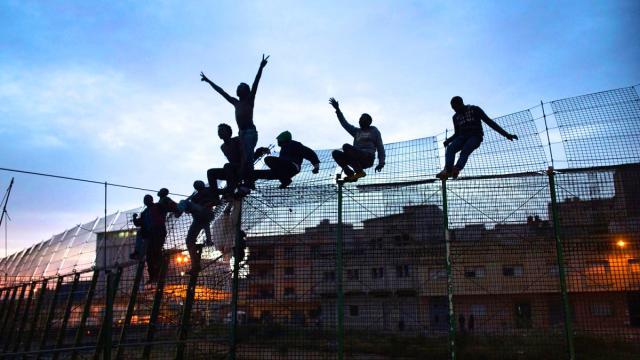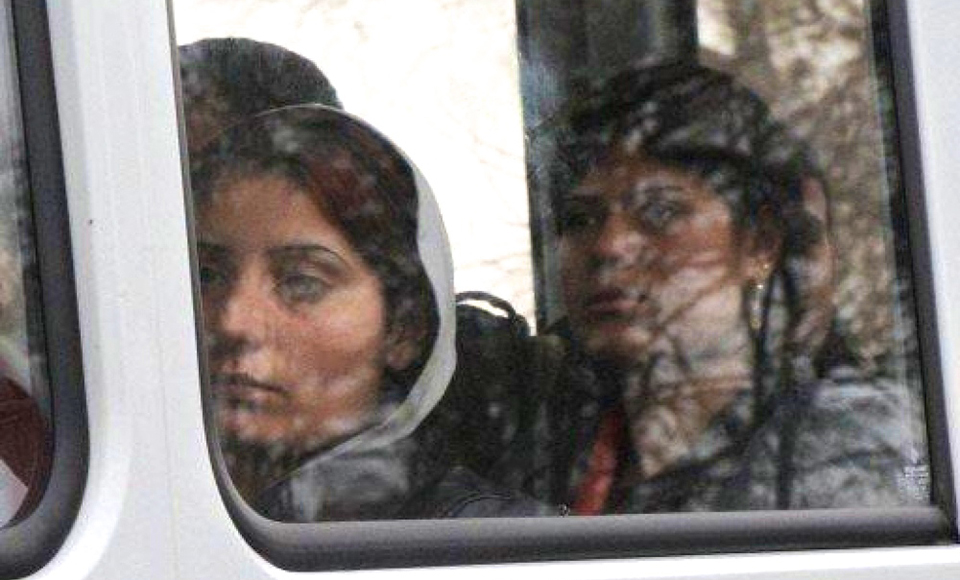
Starting this week, migrants to Europe as well as European citizens who support their right to freedom of movement are making an epic march across Europe to protest the continent's immigration policy – heightening solidarity at a time when anti-immigrant rhetoric dominates the campaigns of many parties seeking votes in this week’s European Parliamentary elections.
“With this March, we want to do something concrete to inspire people,” says Assem, an asylum seeker in Berlin who is a member of a logistics team planning the march. “This is our way of informing people what is really going on – the repression we face as refugees in Europe.”
Hundreds of protestors marked the first milestone of the journey on Sunday by crossing the Europa Bridge that connects the German city of Kehl with the French city of Strasbourg.
For many, the short walk above the Rhine – punctuated by a few moments of silence, as empty pairs of shoes were tied to the bridge’s railings to commemorate thousands of migrants who have lost their lives at sea attempting to reach Europe – marked an act of civil disobedience.
Under the terms of the Dublin II agreement, asylum applications from non-E.U. migrants must be assessed in the first country of entry. The law has, in effect, removed the right of asylum applicants to move freely within the E.U. Most are also denied the right to work while their applications are pending, frequently leaving them for years in a state of limbo shadowed by the ever-present threat of deportation.
In Germany, further restrictions prevent asylum seekers from leaving the federal state where they applied for asylum, to travel within Germany.
Anir, an asylum seeker from Iran, also based in Berlin, is among those who defiantly crossed over into France this week. “Every minute, so many people cross European borders, but to make this action – to say, 'Hey, we have no papers, but we are here in Europe and there is no such thing as an illegal border crossing' – it felt so good,” he tells Occupy.com.
Police on either side of the border observed the March but allowed those taking part to cross unhindered.
“Politically, now we are in the hot phase before the European elections,” says Theresa, who joined the march as part of the legal team providing support and advice in case of arrests. “The European government – and particularly Strasbourg where the seat of the European Parliament is – doesn’t want to have bad media reports or a scandal about peaceful protestors facing repression.”
But Theresa points out that with three more border-crossings ahead of them, before the march culminates in a week-long action in Brussels to coincide with the E.U. summit on migration, many of the demonstrators are taking considerable risks.
Those who have had their asylum applications rejected could face deportation to their countries of origin if arrested, while those still awaiting response could be deported back to their country of residence – which, they admit, will not help their applications.
“I have taken risks because I was not even allowed to leave Berlin,” says Anir. “But there are people who are even in a worse situation than me. [We are] in solidarity with the most marginalized people, none of us bring our documents – we are all sans papier.”
The protestors will spend the next few weeks on the road, sleeping in tents, with local solidarity groups providing food and logistical support along the way. They are calling for others across Europe to join the march, particularly at border crossings between France, Germany, Belgium and Luxembourg – and to leave passports and identity cards at home, both as a symbolic gesture and to make it more difficult for police to single out the most vulnerable demonstrators if arrests are made.
Many of the marchers, forced to flee their countries of origin for political reasons, say they feel compelled to continue their political activism here in Europe.
“When I [saw] a demonstration in Berlin with people holding signs, saying ‘Refugees Welcome!’ I could hardly believe what I was seeing,” says Assem, who has been helping to organize the march since that day. “It was so different from anything I had experienced before in Europe and it affected me deeply.”
The journey this week coincides with elections for European Parliament on Thursday in which right wing parties campaigning on anti-immigrant platforms are expected to make unprecedented gains – from England's UKIP to the Front National in France, and even the neo-Nazi NPD in Germany, which could enter the European Parliament for the first time.
Amid the reactionary fervor, Anir hopes the march will help voters understand the need for greater migrant rights in Europe, and "that people understand there is something wrong here. You have to be responsible about who you vote for and how politicians make decisions that are not at all fair on non-European citizens.”
Anir first lived in Germany as a student and later returned from Iran after he was arrested and tortured for his political activism. With documents that clearly demonstrated the threat of re-arrest by the Iranian regime, he was confident that his asylum application would be quickly approved. A year on, Anir is still waiting for a decision.
“I was really surprised,” he says. “From inside Iran, you think you have so much solidarity from people outside, but actually it's not at all like this. Every month you go to the [immigration authority] and the way they treat us is completely based on discrimination and fear of foreigners.”
In fact, the migrants movement confronts issues beyond an unjust European immigration policy, adds Anir, which is why he'd like to see groups from outside Europe join the protest when they reach their destination in June.
“The problem is not the people, it’s the system – whether it comes in the shape of totalitarianism or dictatorship or in shape of a more democratic capitalism, or whatever,” he says.
“When we occupy Brussels, my dream is to see decentralized actions in New York, Paris, Moscow, Tehran – for people to occupy these cities and say the whole system is the problem, you can't ignore that there are people who have to leave the [nations] they had before and come somewhere else – they are the most marginalized people and they need to be listened to.”
3 WAYS TO SHOW YOUR SUPPORT
- Log in to post comments















